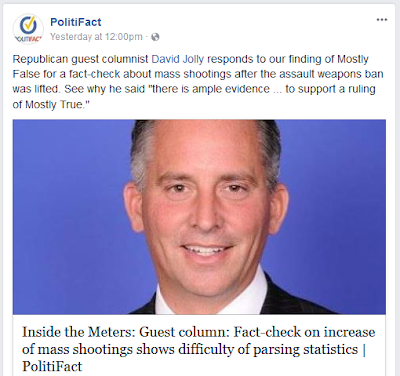PolitiFact said the hire was intended to build trust in PolitiFact across party lines. We've viewed the experiment with justified skepticism. And Jolly's work so far as the "Republican guest columnist" only solidifies our skepticism.
Jolly's first guest column was published March 2, 2018. We noted that Jolly used that column to address a subject tied to his own advocacy of "common sense gun control." We doubted many PolitiSkeptical conservatives would hear their voices in that column. We judged that Jolly was using his position at PolitiFact to essentially write an op-ed about one of his pet political issues.
Jolly's March 7, 2018 column followed that pattern.
Instead of critiquing PolitiFact, Jolly used his column to attack the target of a PolitiFact fact check. The target of that fact check? President Donald Trump.
Jolly (bold emphasis added):
As the nation continues to debate which gun policies might provide for the safety of our schools and communities, PolitiFact demonstrated in a single column the critical importance fact-checkers serve in both informing the American public as well as holding politicians and advocates on both sides of the debate accountable for their assertions.Jolly played his gun control theme song in the background again and again we ask: How does Jolly's approach to his columns build trust among conservatives skeptical of PolitiFact? Does he think that just having a Republican say something like "PolitiFact is right" will budge the needle of partisan mistrust?
We'll go out on a limb and predict that approach has a snowball's chance in hell of working.
Conservative mistrust in PolitiFact stems primarily from two factors:
- Conservatives see PolitiFact turning a blind eye to conservative arguments
- PolitiFact commonly makes errors of fact and logic damaging to conservatives
Jolly reinforces PolitiFact's left-leaning bias
Jolly lauded PolitiFact for rating "False" the claim that an armed civilian might have stopped the "Pulse" nightclub shooting in Orlando (bold emphasis added):"You take Pulse nightclub," Trump said. "If you had one person in that room that could carry a gun and knew how to use it, it wouldn’t have happened, or certainly to the extent that it did."
The problem for both the president and his theory is that an armed officer and 15-year veteran of the Orlando Police Department, Adam Gruler, was actually working security at Pulse that fateful night, and indeed engaged the shooter directly with gunfire. Forty-nine people still lost their lives.
PolitiFact rightly rated as False the president's statement that an armed security guard could have saved those 49 victims.The conservative would have read the PolitiFact fact check looking for evidence of fair treatment of the mainstream conservative point of view. That view is absent, and when Jolly fails to notice its absence and celebrates PolitiFact's fact check in spite of that, the conservative cannot take Jolly's columns any more seriously than the fact check in the first place.
The problem with the fact check
What's the problem with PolitiFact's fact check?The fact check pretends that the armed guard working security in the Pulse parking lot counts as "one person in that room that could carry a gun and knew how to use it."
Is the Pulse parking lot inside the Pulse nightclub?
Shouldn't that make a difference for non-partisan fact checkers and GOP columnists alike?
Note PolitiFact's description of armed guard Anthony Gruler's involvement in the Pulse incident (bold emphasis added):
The Justice Department in 2017 released a nearly 200-page report detailing the Orlando police response to the shooting. Here’s the report’s account of Gruler’s initial confrontation with Mateen:PolitiFact's conclusion, sadly, serves as an adequate summary of its argument:
"Outside, in the Pulse parking lot, (Gruler), who was working extra duty at the club — to provide outside security and to provide assistance to security personnel inside the club if needed — heard the shots that were being fired; at 2:02:17 a.m., he broadcast over the radio, 'Shots fired, shots fired, shots fired,' and requested additional officers to respond.According to an Orlando Police Department report, additional officers arrived on the scene about a minute after Gruler’s call for backup was broadcast. A second backup officer arrived about a minute after that.
"The detective told the assessment team that he immediately recognized that his Sig Sauer P226 9mm handgun was no match for the .223 caliber rifle being fired inside the club and moved to a position that afforded him more cover in the parking lot. Two patrons attempted to flee through an emergency exit on the south side of the club. When the detective saw the suspect shoot them, he fired at the suspect."
Talking about the Pulse nightclub shooting, Trump said, "If you had one person in that room that could carry a gun and knew how to use it, it wouldn’t have happened, or certainly to the extent that it did."Notice that PolitiFact says Gruler was "at the club," not "outside the club."
An armed, off-duty police officer in uniform was at the club during the shooting, and exchanged gunfire with the shooter, who managed to kill 49 people.
We rate this False.
The "False" rating gets its premise from the fiction that Gruler was in the same room with Mateen while the latter was murdering club patrons. Jolly, PolitiFact's voice of the GOP, signs on with that falsehood.
In this case the deception comes from PolitiFact and Jolly. Not from Trump.
PolitiFact demonstrated nothing false in Trump's statement, yet pinned a "False" rating on his statement.
Jolly cheered PolitiFact's work, missing the key discrepancy in its fact check.
That's all kinds of wrong.


